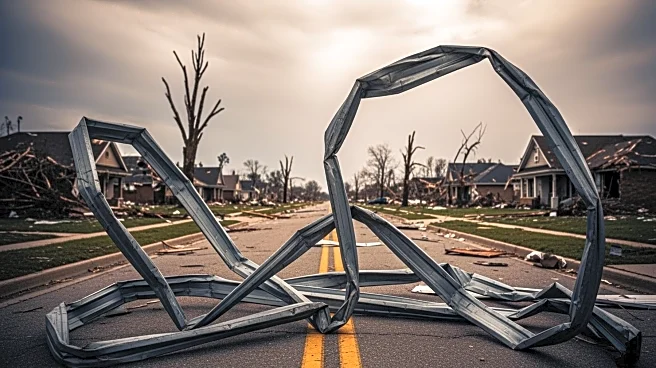What's Happening?
A rare and powerful tornado struck the northern suburb of Ermont, Paris, resulting in the death of a 23-year-old construction worker and injuring at least nine others, including four critically. The tornado,
described by authorities as having 'rare intensity,' caused significant damage by toppling construction cranes, uprooting trees, and damaging infrastructure. The tornado was fueled by a strong area of low pressure in the upper atmosphere, which brought warm, moist southwesterly winds conducive to tornado formation. This event marks France's first deadly tornado in 17 years, highlighting the unusual nature of such severe weather in the region.
Why It's Important?
The occurrence of a deadly tornado in France, a country where tornadoes are typically low intensity, underscores the potential for extreme weather events in regions not commonly associated with such phenomena. This incident raises concerns about the preparedness of infrastructure and emergency services in handling rare but severe weather events. The impact on the local community, including the loss of life and damage to property, highlights the need for improved safety measures and protocols in construction sites and urban planning. Additionally, the event may prompt discussions on climate patterns and their influence on weather anomalies in Europe.
What's Next?
Authorities have opened a criminal investigation into the incident, exploring possible violations of labor codes that may have contributed to the fatality. The investigation will likely focus on safety standards and compliance at construction sites. Meteorologists are monitoring weather patterns closely, as another potent storm system is forecast to hit Paris later in the week, potentially bringing further severe weather. This ongoing situation may lead to heightened alertness and preparedness among local authorities and residents.
Beyond the Headlines
The tornado's occurrence as part of an omega block weather pattern suggests a broader climatic shift that could lead to more frequent extreme weather events in Europe. This may prompt further research into the effects of climate change on regional weather patterns and the need for adaptive strategies in urban planning and disaster management. The event also highlights the importance of international cooperation in meteorological research and emergency response strategies.









